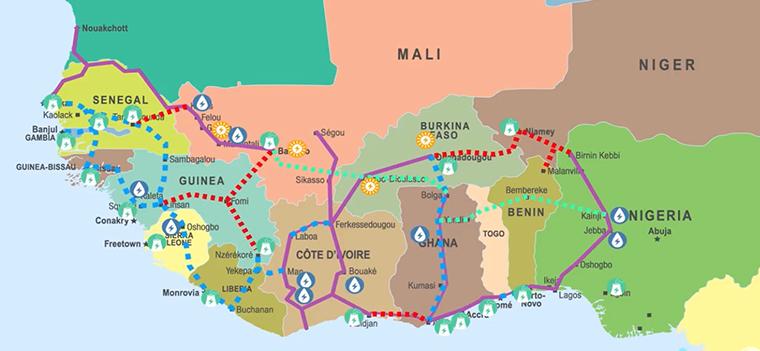News
- Integrated power trade in West Africa could promote significant cost savings in electricity supply, increase access to affordable, reliable and modern energy, and help reduce emissions.
- The World Bank has dedicated US$750 million to support the West Africa Power Pool (WAPP) in promoting an integrated regional power market.
- ESMAP analysis and technical assistance is helping to improve confidence in the market by strengthening utility creditworthiness and other key aspects of the partnership.
Photo Credit: World Bank
Access to energy remains a challenge in West Africa where many countries are dependent on expensive fossil fuels. The World Bank estimates that integrated power trade in the region could lead to many benefits. It would promote cost savings of US$5-8 billion per year by enabling countries to import cheaper sources of electricity, increase access to affordable, reliable and modern energy, and reduce CO2 emission intensity.
The World Bank has dedicated US$750 million in IDA funding to support the West Africa Power Pool (WAPP) – a cooperation of 14 countries–Benin, Burkina Faso, Cote d’Ivoire, the Gambia, Ghana, Guinea, Guinea-Bissau, Liberia, Mali, Niger, Nigeria, Senegal, Sierra Leone, and Togo– with 27 national electricity utilities, working towards an integrated regional power market.
The complexity of regional power markets creates new political and technical challenges that will need to be addressed. A well-functioning regional power market requires not only the right infrastructure, but also strong collaboration among policy makers, regulators, and utilities, at the national and regional level. It also calls for simultaneous policy, regulatory, and institutional steps. Trading institutions and stronger commercial arrangements will need to be developed further.
The World Bank’s Energy Sector Management Assistance Program (ESMAP) is providing financing and technical assistance to tackle these challenges, under the Programmatic Approach to Facilitate Regional Power Trade in Africa.
Through several regional trade workshops, ESMAP aimed at building political support for power trade. Organized around specific topics of interest for each power pool, the workshops have helped to build awareness on the commercial, institutional and regulatory arrangements to facilitate power trade across countries.
Another challenge is the payment record of trading partners in the region that is currently uneven and presents a major obstacle to building trust among partners. In 2016, arrears reached such a level in Western Africa that the West Africa Power Pool (WAPP) formed a special Task Force on Cross-Border Payments for Power Trade to recommend solutions to this problem, with the support of ESMAP. To ensure that West African countries realize regional power integration to its fullest potential, the Task Force recommended a series of actions to improve confidence in the regional power market. These included improving sector creditworthiness, strengthening contracts, providing guarantees and involving regional institutions. A key focus of future World Bank engagement will be to continue strengthening the performance of power utilities as a foundation for improving creditworthiness of offtakers, and provide technical assistance to strengthen bilateral contracts, enhance capacity of power pools (on operational and regulatory aspects) and explore opportunities to provide bilateral and regional guarantees.
Drawing on lessons learned from successful power pools, ESMAP is funding the development of strategies for World Bank engagement with each power pool (West Africa, East Africa and Southern Africa), outlining clear actions and milestones. The strategies are designed based on country needs, focusing on engaging participants in a conversation on the benefits and challenges of power trade and tailoring communication to help build trust.
